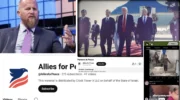Will the US respond forcefully to Israel’s covert campaign to influence our political process, as was the case with the Russians and Chinese? Likely not…
by Ben Freeman, reposted from Responsible Statecraft, June 28, 2024
Last Monday, the Guardian exposed a secret $8.6 million Israeli government campaign to silence its critics in the U.S.
The campaign, known as “Concert,” is, “part of a broader public relations campaign to target US college campuses and redefine antisemitism in US law,” according to the Guardian. This follows a New York Times story on June 5 that offered vivid details of a $2 million covert social media campaign, paid for by the Israeli government, encouraging American policymakers to continue supporting Israel’s military.
If this sounds familiar, it should — this is the same tactic Russian operatives used in an illicit influence operation that targeted the 2016 U.S. election. That campaign also used networks of fake social media accounts, posing as Americans, in an attempt to influence the U.S. political process. The Russian operation led to outrage from policymakers and the media, multiple year’s-long investigations, and the indictment of 13 Russian nationals and three Russian companies for their involvement in the illicit influence operation.
Will Washington respond just as forcefully to a similar campaign orchestrated by an American ally? Don’t count on it.
In the more than three weeks since the Times story ran, only a handful of policymakers have even acknowledged the allegation that the Israeli government was behind an influence campaign targeting U.S. politicians. Just one Member of Congress, Rep. Mark Pocan (D-Wis.), has mentioned it on social media. Senator Richard Blumenthal (D-Conn.), who was targeted at least 88 times by the campaign, told Politico, “I want to know exactly what was done by whom and who was contacted.”
But Blumenthal was alone in his outrage, as Politico reported that “over a dozen other lawmakers targeted in the campaign did not respond to a request for comment.” Similarly, Wired reported earlier this month that with just two exceptions — the White House’s National Security Council denying knowledge of the attack, and the office of Senator Mark Warner (D-Va.)requesting a briefing — ”press inquiries concerning Israel’s attempts to secretly influence US opinion on the war have been met with a stonewall.”
The only time the Biden administration even acknowledged the story was at a State Department press briefing on the afternoon the article ran. Spokesperson Matthew Miller was asked how he saw “this differently from what Iran, Russia, and China all do.” Miller responded that he didn’t have “any comment on the underlying facts. But I will say we have very clear laws on the books in the United States about foreign influence campaigns. We enforce those laws vigorously and we expect everyone to comply with them.”
Miller is, unfortunately, only half right. We do have very clear laws in the U.S. about foreign influence campaigns — most notably the Foreign Agents Registration Act (FARA) — but we do not expect everyone to comply with them. When it comes to regulating foreign influence in America there are, in reality, two sets of laws: one for America’s perceived friends and one for its enemies.
When America’s adversaries commit transgressions on U.S. soil they are justifiably held to account and the perpetrators face stiff punishments. For example, in 2023, a think tank executive who was allegedly covertly advancing Chinese interests in the U.S. and violating U.S. sanctions against Iran was arrested and charged with several crimes, including failing to register under FARA.
If convicted, she could face up to 100 years in prison. As mentioned above, 13 Russians and three Russian firms were indicted for violating FARA and a host of other laws in connection with their 2016 election interference campaign. Most of them remain on the FBI’s most wanted list.
Since their indictment, eleven other individuals connected with illicit Russian influence operations have been indicted for violating FARA or the related 18 U.S.C. § 951 statute, according to the Department of Justice.
The U.S.’s response to the malign actions of America’s “friends” has been quite different.
The United Arab Emirates, for example, has repeatedly been caught orchestrating illicit influence operations in the U.S. The UAE’s meddling has become so pervasive that “U.S. intelligence officials have compiled a classified report detailing extensive efforts to manipulate the American political system by the United Arab Emirates,” according to the Washington Post.
Yet, instead of punishing the UAE for these myriad transgressions, the U.S. has increased military ties with the authoritarian regime. In fact, the UAE has been afforded the opportunity to put more former high-ranking U.S. military personnel on its payroll than the rest of the world — including all actual U.S. allies — combined.
The Kingdom of Saudi Arabia has similarly evaded punishment for its transgressions on U.S. soil. Despite compelling evidence of the Saudi government’s complicity in the terrorist attacks of 9/11, the U.S. government has, for more than two decades, refused to publicly release all information related to the Saudi government’s involvement. More recently, the government of Saudi Arabia has allegedly been operating a ring of “fixers” around the U.S. that whisks Saudi citizens accused of crimes — including possession of child pornography, rape, and even murder — out of the U.S.
Saudi Arabia has also been repeatedly caught operating bot networks on social media platforms — not too dissimilar from those used by Russian operatives in 2016.
Given these myriad slights, how is the Biden administration preparing to hold the Kingdom accountable? By offering the Saudis a security pact, which would ask U.S. service members to fight and die for the Kingdom, as part of a normalization deal with Israel.
If history is any indication, a U.S. ally like Israel is unlikely to face any real punishment for allegedly financing an illicit influence operation in the U.S. And that is a problem. If America does not effectively punish and discourage illicit influence operations orchestrated by America’s so-called friends, we embolden America’s enemies to adopt these same tactics.
For this reason, if we’re committed to combating malign foreign influence in the U.S., we must hold our enemies and allies accountable when they illegally meddle in our nation’s business. No country, including Israel, is above the law.
Editor’s note: Israel is not a US ally. It’s influence is due to the power of its partisans in the United states, who form one of the most powerful lobbies in the world. The pro-Israel lobby has operated in the US for over a century. It is far more powerful than Saudi Arabia and the UAE in influencing US policies.
Ben Freeman is Director of the Democratizing Foreign Policy program at the Quincy Institute. He investigates money in politics, defense spending, and foreign influence in America.
RELATED:
- Israeli documents show expansive government effort to shape US discourse around Gaza war
- Israel Secretly Targets U.S. Lawmakers With Influence Campaign on Gaza War
- Cyabra: the Intelligence Cutout Waging Israel’s Online Propaganda War
- Spying & threats: Israel spent 9 years trying to keep the ICC off the trail of Israel’s war crimes
- Netanyahu’s covert operation to manipulate 2016 US election
- WATCH: Suppressed Al Jazeera film details the Israel lobby’s ‘covert war’ to manipulate Americans





